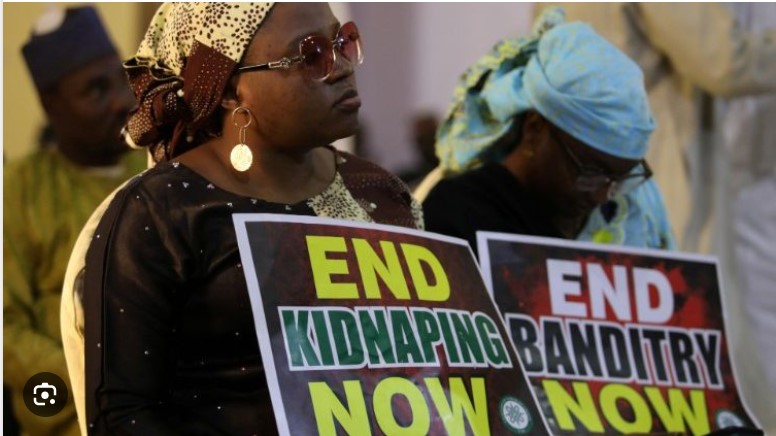By Joke Kujenya
OVER the last decade, Nigeria, has been a nation marred by a tumultuous history of conflict and instability despite her being celebrated for her cultural diversity and rich heritage.
Currently, she stands at a crossroad overshadowed by a pervasive crisis as she is ensnared in a web of kidnappings and abductions that have plagued her communities for over a decade.
As the frequency and brutality of these incidents escalate, and the nation grapples with profound questions begging for answers, as this analysis delves into the harrowing chronicles of Nigeria’s past, tracing the origins, perpetrators, victims and enduring impact of this pervasive crisis.
FROM around year 2020, Nigeria suddenly began to witness a surge in kidnapping incidents, particularly in rural areas of the northwest and central regions. It was then deemed to serve as a grim reminder of the nation’s unresolves security crisis.
Criminal gangs, colloquially tagged as “bandits” spearheaded this wave of violence, targeting ordinary citizens, schoolchildren and even foreigners in some cases.
In particular, the abduction of over 300 schoolboys from the Government Science Secondary School in Kankara, Katsina State in December of 2020, epitomized the audacity and brutality of these criminal elements in the country.
The international outcry that ensued underscored the gravity of Nigeria’s security crisis and the urgent need for decisive action and the ominous trajectory the country finds herself on.
As the calendar turned to 2021, kidnapping continued unabated, with criminal groups expanding their operations and tactics. Schools became their prime targets, with hundreds, now thousands of students and still counting, falling victim to abductions.
Since the end of February, over 500 individuals have fallen victim to mass abductions, igniting fear and outrage across the nation. This disturbing trend mirrors past atrocities, including the highly publicized abduction of 276 school girls by Boko Haram in Chibok, Borno State, nearly a decade ago.
Also, the abduction of over 200 girls from the Government Girls Secondary School in Jangebe, Zamfara State, leaves unhealed pains in the hearts of their beloved ones.
The chronicle of recent kidnaps unfolds with chilling precision. Suspected Boko Haram militants, notorious for their brutality, struct again in Borno State, abducting over 200 individuals, predominantly women and children.
Meanwhile, in the Northwest, armed bandit groups orchestrated a relentless series of mass abductions, targeting schools Islamic institutions, and communities with impunity.
And the last month abduction of 287 pupils in Kaduna, followed by subsequent incidents in Sokoto and Kajuru, underscores the audacity and cruelty of the perpetrators.
Question of Perpetrators
This looms large, casting a sinister shadow over Nigeria’s future. While Boko Haram’s involvement in the North East is widely suspected, the rise of armed bandit groups in the North West adds another layer of complexity.
These groups, as reports have shown, are driven by profit and impunity, as they exploit the vulnerability of rural communities, exacerbating the crisis and challenging the capacity of law enforcement agencies.
The resurgence of mass kidnappings is also found to be rooted in a complex web of socioeconomic factors, including economic instability, political unrest, and the insatiable greed of criminal elements.
As armed bandits evolve their tactics and exploit vulnerabilities, Nigeria’s rural population remains at the mercy of relentless attacks. The decline in profitability of individual kidnappings has driven perpetrators to orchestrate mass abductions, which carry the potential for government ransom payments and exert significant pressure on authorities to secure the release of the victims.
Looking ahead
The path forward seems fraught with uncertainty. With state forces stretched thin and communities living in fear, the prospect of sustained mass abductions threatens to unravel the very fabric of Nigerian society.
Reactive military actions alone cannot stem the tide of violence. It requires a comprehensive approach, to address and redress both immediate security concerns and the underlying socioeconomic factors driving conflict, which is quite imperative.





